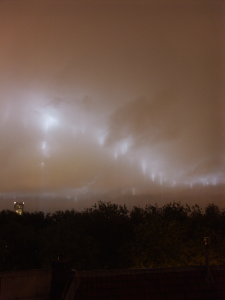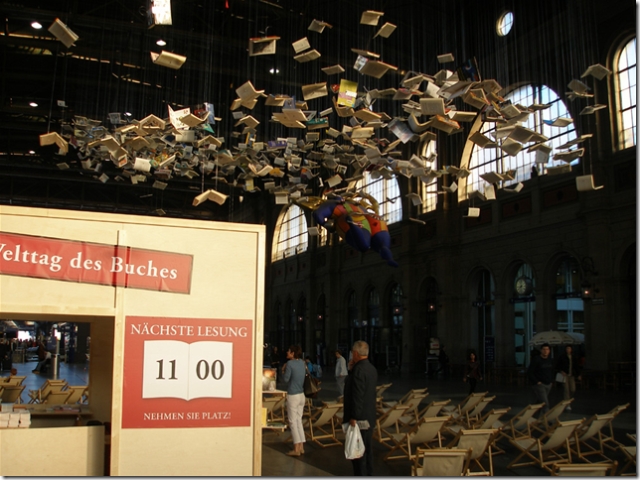'Arts & Culture'

Gestern nacht stand der Himmel über Rotterdam in ein gespenstisches Licht getaucht. Die tiefhängenden Regenwolken trugen das Ihre bei. Lediglich die Farbe passte nicht zu einem Grossbrand, zu weiss… Rotterdam gedachte zum ersten Mal öffentlich und in grossem Massstab dem deutschen Bombardement vom 14. Mai 1940, dem Tag, als die gesamte Innenstadt zu Schutt und Asche gemacht wurde. Entlang der Brandgrenze von damals hatte das Büro Mothership 128 Scheinwerfer aufgestellt, die in den Himmel zündeten. 2010, zum 70sten, wird dann eine feste Installation von Adriaan Geuze, Bureau West 8, gebührend an das Ereignis erinnern.
War das Bombardement Glück oder Schaden für Rotterdam — wohl beides. Über 800 Tote, 80.000 Obdachlose ist die eine Bilanz; Raum, über moderne Stadtentwicklung nachzudenken, die andere. Platz, zum Beispiel, für die wohl weltweit erste autofreie Ladenpassage in der Innenstadt, die Lijnbaan, als Modell heute kaum mehr wegzudenken aus unseren Innenstädten. Platz für eine Skyline, die “Welthafen” sagt. Platz für städtebauliches Nachdenken darüber, ob Bauten der 50er Jahre als Monumente stehen bleiben sollen, oder neuen architektonischen Ergüssen weichen sollen. Immerhin gibt’s in Holland doppelt so viele Architekten pro Einwohner, wie Hausärzte.
Die gestrige Installation war übrigens Teil von Rotterdam 2007 – City of Architecture. Und wenn sich Twan Nijssen in seinem Comment zum Artikel im AD eher an Albert Speer erinnert sehen wollte, wird man sich nicht enthalten können, auf die Organisation der niederländischen Polizei zu verweisen, die von Himmlers holländischem Stellvertreter Hanns Albin Rauter organisiert wurde — und bis heute so besteht (Johannes Houwink ten Cate: Cyrille Fijnaut en anderen – De geschiedenis van de Nederlandse politie).
The “Copyright Subgroup” of the “High Level Expert Group” has published its “Report on Digital Preservation, Orphan Works, and Out-of-Print Works. Selected Implementation Issues”.
The main point is, that the group proposes to uphold the principle of “rightholders’ consent”. However, the recommendations “deal with digital copying for the purpose of preservation only”. So they don’t give an answer to the question of giving access to digital assets (i.e. the Google books question).
The group also highlights that “a solution to the issue of orphan works is desirable”, but it does not come up with a straight forward solution. Rather it leaves it to the member states to decide on orphan works.
For out of print works, the group refers to its decision of 16 October 2006 when it proposed a model license for libraries to make out of print works accessible digitally in closed networks. This model license has not been implemented so far.
The press release and full content of the report are available at http://www.europa.eu/rapid/pressReleasesAction.do?reference=IP/07/508&format=HTML&aged=0&language=EN&guiLanguage=en.
Today is the 26th of April. The UNESCO celebrations of books and copyrights still resound all over the world. It’s been a happy party of books, writing and reading.
But today, there is another sound in the air. The sound of ‘intellectual property’, of ‘my creativity is my castle’ — it’s the WIPO’s ‘Celebrations’ for the World Intellectual Property Day. Their topic is actually creativity.
Quite rightly they note in their press release that “the word creativity conjures a world of artists and music makers, of poets and problem solvers. Whereas intellectual property all too often summons images of gray-suited lawyers, locked in litigation. But look more closely, and it quickly becomes clear that it is the intellectual property system itself which sustains and nourishes those creators.”
It is the intellectual property system that not only nourishes creators but, oddly enough, every so often also reduces them to mere content suppliers to the all powerful engines of the commercial IP explitation industry. Encouraging creativity to supply the pockets of publishers, distributors, marketeers … ?
Hence, I come back to number 3 of our postulates: Authors need to be free to make a choice on licensing their works for reproduction, communication, distribution, interpretation, and modification in any form and medium of their choice without pressure or interference from others.
Texts Don’t Grow en Trees! — Creation is 10 % inspiration and 90 % transpiration — we need to make sure it does not become 99 % exploitation.
The activities of the World Book and Copyright Day 2007 are well under way … for example in Switzerland, where Roger Lévy blogs live from Zurich main station (in German).

WIPO went to see a group of 16-17 year old students at an international school to find out, how they think about downloading music from the Internet. The first point went to WIPO — the students actually believe that downloading is illegal (which it might or might not be, depending on national legislation). But the downloaders scored all the other points — and I’ll cite only a selection, the whole story is here — “I wouldn’t steal a car. I wouldn’t steal a DVD. But I might borrow a DVD from a friend. And what’s the Internet these days, but a big group of friends sharing stuff?” — “Downloading seems kind of unreal compared to other crimes,” — “They’ve [the music industry] got to find ways to make money other than selling CDs, because stopping people from downloading illegally is, well, extremely hard.” — “they should work harder on making us want to pay for it.”– “We’re always being told: ‘don’t smoke, you’ll get caught; ‘don’t do this, you’ll get caught’… the messages just don’t affect us any more.” — “Just give us simple facts and figures.”
So the message is very clear: downloading is understood as the online equivalent of borrowing, not of buying. It is a reality. And the “kids” are not stupid, they bloody damn well understand the way the business works. Only that some do not seem to be noticing that. I feel that this is the really big chance we get with “Texts Don’t Grow on Trees!”, to campaign intelligently, to listen to our clientele, to understand how they think about the Internet.
Monday is the UNESCO world book and copyright day. And that is our message:
1. Authors must never be pressured into waiving their rights to be named as the authors of their work.
2. Authors must never never be pressured into allowing their works to be treated in a derogatory manner.
3. Authors need to be free to make a choice on licensing their works for reproduction, communication, distribution, interpretation, and modification in any form and medium of their choice without pressure or interference from others.
4. Authors must be rewarded by a conforming and timely execution of the licenses by their licensees.
5. Authorsmust be remunerated in fair relation to the profits arising from the licensed exploitation of their work.
Some might say that this is a complicated message. But I am sure the “kids” will get it.
The “Nederlandse Mededingingsautoriteit” — the Dutch cartel police — is mainly powerless in face of megafusions in the energy, health or banking sector. But now they have found another group of criminals: translators. Illegally they have set a minimum fee, e.g. 5,9 Eurocent per word for translations from English or Hungarian. But this has now led to interventions, first an article in the NRC Handelsblad by Maarten Huygen (31. March). Now Mei Li Vos, Labour MP, asked the staatssecretaris van Economise Zaken 10 questions: if she was aware of this problem, aware of the (economic) pressure freelancers work under in the media, aware of the new regulations in Germany, where exactly such minimum fees are legal, and if she was prepared to introduce similar changes to the regulations in the Netherlands.
see also Mei Li Vos’ website and the report on boekvertalers.nl
“I’ve always wanted publishers and organized crime to swap.” This strapline caught my eyes this morning when I was combing through my already spam-stripped inbox. Some semi-intelligent robot out there on the net must have picked it up in order to fulfill one of my requests for up-to-date knowledge. (Yes, I admit, I am interested in organized crime).
But what it brought up today is a completely different story. It’s the musings of Dusk Peterson, fiction writer, history writer, editor and journalist, on the not-so-delightful world of e-book publishing.
I spent nearly four hours researching whether I should make my online fiction available in e-book form at Lulu.com. While I’m still not sure whether anyone would actually buy my stories – I wouldn’t buy an electronic text if it was available for free – I decided to go ahead and try the experiment. It can’t hurt. At this stage, even a couple of extra dollars would help.
However, set-up fees, buying ISBNs — “which is more money than I’ve earned annually since 1992″ — and the time (and nerves) spent on preparing the cover art make this experiment a rather serious experience. Is this the brave new world of self-determined, self-controled, self-publishing authors?
In den vergangenen Tagen und Wochen gab’s wieder mal seltene Klänge in Rotterdam. Erst am 28. März ein Film Screening von Pilgrimage from Scattered Points — Luke Fowlers Dokumentarfilm über das britische Scratch Orchestra, danach Konzert mit Scratch “Haus-Marxist” Keith Rowe:
Download der Datei auf die eigene Festplatte:
Audio clip: Adobe Flash Player (version 9 or above) is required to play this audio clip. Download the latest version here. You also need to have JavaScript enabled in your browser.
Dann am Samstag vor Ostern erst noch mal John Buijsman’s Public Animal aus Texten von C. B. Vaandrager, dem Rotterdamer Punk-Poet der 60er. Danach Levende poëzie met Jazzmuziek hard-op:
Im FOAM gibts Fotografien von August Sander, Köln, 20er Jahre: die Menschen des 20sten Jahrhunderts. Nicht nur uns hat’s diese Sekretärin des Westdeutschen Rundfunks (1931) angetan. Ausserdem eine Klassierung der Menschen in soziologische Lebenslagen: Bauer, Handwerker, Frau, Würdenträger, Künstler, grosse Stadt, letzter Mensch; z.B. mit Mittelklasse-Kindern und jungen Bauern; noch bis 21. März.
Tag(s): foam august sander köln amsterdam fotos ausstellungen kulturtv kultpavillon
So, was tun wir an einem Regentag in Holland? Im Post-Fastnachts-Blues, und eben erst zurückgekehrt nach einer Woche Sonne (und Arbeit) in Zürich/Bern/Luzern? Wir geben uns bildungsbeflissen und fahren nach Ams ins Van Gogh Museum, wo noch bis zum 3. März sein Einfluss auf die Expressionisten zelebriert wird. Wir wissen, wie wir die Schlange an der Kasse überspringen können (online Tickets sind auf der Museums-Website zu kaufen, wer mehr als 2x pro Jahr kommt, kauft sich die Museumskarte für EUR25).
Drinnen ist die Aussicht auf die Bilder durch Menschenmassen zwar fast verbaut, aber das stört weiter nicht, denn die eigentlich interessante Vitrine interessiert niemanden: wie nämlich die Witwe von Vincent’s Bruder gezielt die Ausstellungmacher der Berliner und Wiener Secession und von ein paar anderen Galerien auf Vincent’s Werk angefixt hat … eine Lehrstunde in Kulturmarketing sondergleichen. “Sehr geehrte geachtete Frau”, schreiben die Galeristen zurück, und bitten um Erlaubnis, das eine oder andere Werk in einer Kunstpublikation zu reproduzieren. So also wurde der Ruhm gemacht. Die in den Ausstellungstexten krampfhaft gepredigte Ähnlichkeit von van Goghs Kornfeld und Kirchners Nollendorfplatz kann ich schwer nachvollziehen. Doch das Kunstpodest funktioniert und zieht Publikum und so gehen wir weiter.
Tag(s): vincent van gogh rotterdam holland ausstellungen kulturtv kultpavillon



